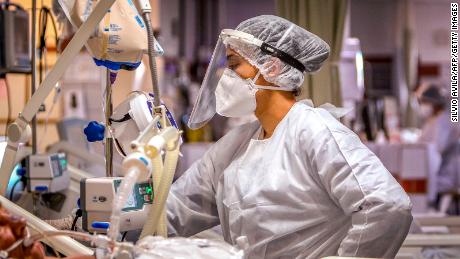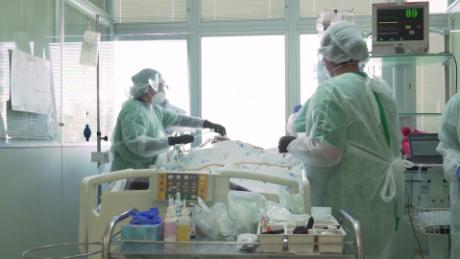(CNN)Many countries are getting a shot of hope this month as they vaccinate health workers against the coronavirus, but Brazil seems stuck in limbo, despite its own vaunted national vaccination program.
In an early Christmas gift to some, Chile and Mexico began immunizations on Thursday after granting emergency approval for the Pfizer/BioNTech vaccine. But in Brazil, where the Covid-19 death toll is far higher, lifesaving inoculation could be out of reach for months -- the country's Health Ministry announced last week that vaccinations would begin in February 2021.
Carla Domingues, an epidemiologist and former coordinator of Brazil's National Immunization Program, told CNN that she is "very disappointed" with how far behind Brazil seems to be falling in the race to herd immunity.
Because Brazil has a strong track record of nationwide vaccination, she says there was a widespread expectation that Brazilians would have a regional advantage in the battle against the pandemic.
"Brazil has always been the leader in the implementation of new vaccines. We manage to achieve high vaccine coverage, even though it is a continental country with very different regions, such as S├Żo Paulo with a high population density and Amazonas, with huge distances, (and) an indigenous population," she said.
"People were expecting that the Brazilian vaccination program would start earlier," she said. But "other countries of the Americas that prepared themselves are already starting the vaccination, and Brazil has been left behind."
Every day the virus rages uncontrolled in Brazil is lethally costly. Nearly 190,000 people there have been killed by Covid-19 -- the highest reported death toll worldwide after the United States. Yet President Jair Bolsonaro has publicly second-guessed the urgency of immunization, disparaging "the rush for a vaccine."
"The pandemic is really reaching its end, the numbers have showed this, we are dealing with small rises now," he said Saturday, according to CNN Brasil. "But the rush for the vaccine is not justified because you are playing with people's lives."
With more than 7.4 million people diagnosed with Covid-19 in Brazil and new variants of the virus appearing abroad, there's little reason to think that the pandemic is tapering off -- a claim that Bolsonaro repeatedly made this year, even as cases continued to mount in the country. Only the US and India have reported more coronavirus infections than Brazil.
The Brazilian President also made headlines last week with an outlandish attempt to sow doubt about potential side effects from the Pfizer vaccine. "If you become an alligator, that is your problem," he warned. "If you become Superman, or grow a beard as a woman, or a man's voice becomes high pitched, I have nothing to do with that ... or worse interfere in people's immune systems."
Pfizer did not respond to CNN's request for comment.
Domingues believes that Brazil's federal government was caught unprepared to use the Pfizer/BioNTech vaccine, after throwing its support behind a vaccine candidate by Oxford University and AstraZeneca, which have partnered with local foundation Fiocruz. According to a statement published last week by the Health Ministry, Brazil has agreed to acquire more than 100 million doses of that vaccine, which remains in development.
In 2021, Bolsonaro's government will also receive nearly 43 million vaccine doses through the COVAX Facility, and has signed a memorandum of understanding to acquire 70 million doses from Pfizer, and another 38 million from Johnson and Johnson subsidiary Janssen. However, most doses of the latter two vaccines aren't expected to become available until late in the year, according to the Health Ministry's statement.
Initially, Domingues says, "the Health Ministry tried to be cautious and only agreed to acquire the vaccine with the AstraZeneca laboratory and was not prepared to receive the new vaccines that require storage at lower than 70 (degrees Celsius)." Pfizer's vaccine must be stored at ultra cold temperatures, around minus 75 degrees Celsius -- which is about 50 degrees colder than any vaccine used in the United States before the pandemic.
Meanwhile fears linger over the influence of politics on the process, after a year of bitter clashes between Bolsonaro and state governors over the country's pandemic response.
The President has made no secret of preferring the Oxford/AstraZeneca vaccine to a vaccine developed by Chinese maker Sinovac Biotech, which is backed by the state of Sao Paulo and in development locally with Brazilian lab Butantan Institute.
Counter to assurances from Brazil's Health Minister Eduardo Pazuello and other officials that any vaccine approved by health regulators will be welcomed by the federal government, Bolsonaro has vowed on Facebook not to purchase the Chinese-made vaccine, and his political boosters have worked to inflame xenophobia and fear around it.
No vaccine has yet been approved by Brazil's health regulator ANVISA, which is under pressure by the country's Supreme Court and congressional leaders to take action. Domingues says she trusts that the agency's experts and officials "will not accept political interference" from any quarter as they evaluate the science and safety of each candidate.
Ordinary Brazilians, however, may not be as immune to influence, especially when it emanates from the highest levels of government. As in many countries, an anti-vaxxer movement has been growing in Brazil for years. And in addition to airing doubts about some vaccines and dismissing the gravity of the virus itself, Bolsonaro has offered fuel to anti-vaxxers by pledging that he will personally refuse vaccination because he's already had Covid-19 -- despite evidence that reinfection, though rare, is possible.
ANVISA and the Brazilian Health Ministry did not respond to requests for comment.






